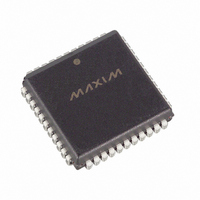DS2180AQ Maxim Integrated Products, DS2180AQ Datasheet - Page 21

DS2180AQ
Manufacturer Part Number
DS2180AQ
Description
IC TRANSCEIVER T1 44-PLCC
Manufacturer
Maxim Integrated Products
Datasheet
1.DS2180A.pdf
(35 pages)
Specifications of DS2180AQ
Function
Transceiver
Interface
T1
Number Of Circuits
1
Voltage - Supply
4.5 V ~ 5.5 V
Current - Supply
3mA
Operating Temperature
0°C ~ 70°C
Mounting Type
Surface Mount
Package / Case
44-LCC, 44-PLCC
Includes
Alarm Generation and Detection, B7 Stuffing Mode, B8ZS Mode, Error Detection and Counter, "Hardware" Mode, Transparent Mode
Lead Free Status / RoHS Status
Contains lead / RoHS non-compliant
Power (watts)
-
Available stocks
Company
Part Number
Manufacturer
Quantity
Price
Company:
Part Number:
DS2180AQ
Manufacturer:
DALLAS
Quantity:
5 510
Part Number:
DS2180AQ
Manufacturer:
DALLAS
Quantity:
20 000
Company:
Part Number:
DS2180AQ+
Manufacturer:
Maxim Integrated Products
Quantity:
135
Company:
Part Number:
DS2180AQ+
Manufacturer:
Maxim
Quantity:
24
Company:
Part Number:
DS2180AQ+T&R
Manufacturer:
Maxim Integrated
Quantity:
10 000
Company:
Part Number:
DS2180AQ/T&R
Manufacturer:
Maxim Integrated
Quantity:
10 000
Company:
Part Number:
DS2180AQN
Manufacturer:
DALLAS
Quantity:
1 373
Company:
Part Number:
DS2180AQN
Manufacturer:
JRC
Quantity:
1 374
RYEL OUTPUT
The yellow alarm output transitions high when a yellow alarm is detected. A high-low transition indicates
the alarm condition has been cleared. The RYEL bit (RSR.5) is a “latched” version of the RYEL output.
In 193E framing, the yellow alarm pattern detected is 16 pattern sets of 00 (Hex) and FF (Hex) received
at RLINK. In 193S, framing the yellow alarm format is de-pendent on CCR.3; if CCR.3=0, the RYEL
output transitions high if bit 2 of 256 or more consecutive channels is 0; if CCR.3=1, yellow alarm is
declared when the S-bit received in frame 12 is 1.
RBV OUTPUT
The bipolar violation output transitions high when an accused bit emerges at RSER. RBV will go low at
the next bit time if no additional violations are detected.
RFER OUTPUT
The receive frame error output transitions high at the F-bit time and is held high for two bit periods when
a frame bit error occurs. In 193S framing, F
framing. Additionally, in 193E framing, RFER reports a CRC error by a low-high-low transition (one bit
period wide) one half RCLK period before a low-high transition on RMSYNC.
RESET
A high-low transition on
high. This reset has no effect on transmit frame multiframe or channel counters.
system power-up to insure proper initialization of transceiver counters and registers. Following reset, the
host processor should restore all control modes by writing appropriate registers with control data.
ALARM OUTPUT TIMING Figure 21
NOTES:
1. RFER transitions high during F-bit time if received framing pattern bit is in error. (Frame 12 F-bits in
2. RBV indicates received bipolar violation and transitions high when an accused bit emerges from
3. RCL transitions high (during 32nd bit time) when 32 consecutive bits received are 0; RCL transitions
193S are ignored if CCR.3=1). Also, in 193E, RFER transitions 1/2 bit time before the rising edge of
RMSYNC to indicate a CRC error for the previous multiframe.
RSER. If B8ZS is enabled, RBV will not report the zero replacement code.
low when the next 1 is received.
RST
clears all registers and forces immediate receive resync when
T
and F
21 of 35
S
patterns are tested. The FPS pattern is tested in 193E
RST
must be held low on
RST
DS2180A
returns












